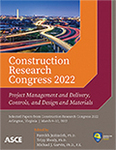Global and Local Risk Factors Causing Correlation between Activities in Fuzzy Linear Schedules
Publication: Construction Research Congress 2022
ABSTRACT
Construction projects encounter numerous risk factors during their life cycle. Some risk factors can impede the progress of all or some activities and cause their durations to be correlated, which ultimately affects the entire schedule. This is especially visible in linear and repetitive schedules that plot the detailed work progress over time. This paper explores such risk factors that cause correlated activities and investigates their influences on fuzzy linear schedules. The contribution is twofold: First, it categorizes risk factors into global and local according to whether their effect is upon all activities within the schedule or not. It creates a mathematical model to simulate such risk factors on fuzzy linear schedules to evaluate and visualize their effects on project durations. Second, it investigates the promote-or-inhibit effect based on the correlation values that they can cause (where 0 to +1 promotes and −1 to 0 inhibits) within various schedules. This research enables decision-makers to evaluate risk factors to protect schedules by taking preventive action.
Get full access to this article
View all available purchase options and get full access to this chapter.
REFERENCES
AbouRizk, S. M. (2010). “Role of Simulation in Construction Engineering and Management.” J. Constr. Eng. Mgmt., 136(10): 1140–1153.
Harris, R. B., and Ioannou, P. G. (1998). “Scheduling Projects with Repeating Activities.” J. Constr. Eng. Mgmt., 124(4): 269–278.
Ioannou, P. G., and Martínez, J. C. (1998). “Project Scheduling Using State-Based Probabilistic Decision Networks.” Proc. Winter Sim. Conf., 2: 1287–1294.
Katsuragawa, C. M., Lucko, G., Isaac, S., and Su, Y. (2021). “Fuzzy Linear and Repetitive Scheduling for Construction Projects.” J. Constr. Eng. Mgmt., 147(3), 04021002(13).
Malcolm, D. G., Roseboom, J. H., Clark, C. E., and Fazar, W. (1959). “Application of a Technique for Research and Development Program Evaluation.” Op. Res., 7(5): 646–669.
Su, Y., and Lucko, G. (2016). “Linear scheduling with multiple crews based on line-of-balance and productivity scheduling method with singularity functions.” Aut. Con., 70(October), 38–50.
Su, Y., Lucko, G., and Thompson, R. C. (2020). “Apportioning Contract Float with Voting Methods to Correlated Activities in Network Schedules to Protect Construction Projects from Delays.” Aut. Con., 118(October), 103263(16).
Wang, W. C., and Demsetz, L. A. (2000). “Model for Evaluating Networks under Correlated Uncertainty – NETCOR.” J. Constr. Eng. Mgmt., 126(6): 458–466.
Yang, I. T. (2006). “Using Gaussian Copula to Simulate Repetitive Projects. Con. Mgmt. Econ., 24(9): 901–909.
Information & Authors
Information
Published In
History
Published online: Mar 7, 2022
Authors
Metrics & Citations
Metrics
Citations
Download citation
If you have the appropriate software installed, you can download article citation data to the citation manager of your choice. Simply select your manager software from the list below and click Download.
